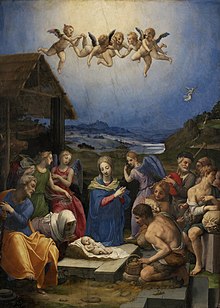| Hark! The Herald Angels Sing | |
|---|---|
 Worship of the Shepherds, 1539, by Bronzino | |
| Genre | Christmas carol |
| Written | 1739 |
| Text | Charles Wesley, adapted by George Whitefield and others |
| Based on | Luke 2:14 |
| Meter | 7.7.7.7 D with refrain |
| Melody | "Vaterland, in deinen Gauen" from Festgesang by Felix Mendelssohn, adapted by William H. Cummings |
"Hark! The Herald Angels Sing" is an English Christmas carol that first appeared in 1739 in the collection Hymns and Sacred Poems. The carol, based on Luke 2:14, tells of an angelic chorus singing praises to God. As it is known in the modern era, it features lyrical contributions from Charles Wesley and George Whitefield, two of the founding ministers of Methodism, with music adapted from "Vaterland, in deinen Gauen" of Felix Mendelssohn's cantata Festgesang (Gutenberg Cantata).
Wesley had written the original version as "Hymn for Christmas-Day" with the opening couplet "Hark! how all the Welkin (heaven) rings / Glory to the King of Kings".[1] Whitefield changed that to today's familiar lyric: "Hark! The Herald Angels sing, / 'Glory to the new-born King'".[2] In 1840—a hundred years after the publication of Hymns and Sacred Poems—Mendelssohn composed a cantata to commemorate Johannes Gutenberg's invention of movable type, and it is music from this cantata, adapted by the English musician William H. Cummings to fit the lyrics of "Hark! The Herald Angels Sing", that is used for the carol today.[3][2]
- ^ "Hymn Texts and Tunes: Hark! the herald angels sing (125)". Evangelical Lutheran Hymnary Handbook. Bethany Lutheran College. Retrieved 15 July 2023.
- ^ a b "Hark! the Herald Angels Sing" at Hymns and Carols of Christmas
- ^ John Wesley; Charles Wesley (1743). Hymns and Sacred Poems (4th ed.). Bristol: Felix Farley. pp. 142–143 – via Internet Archive.